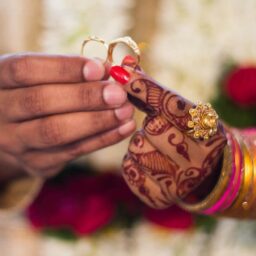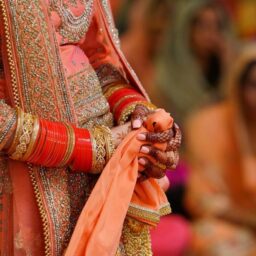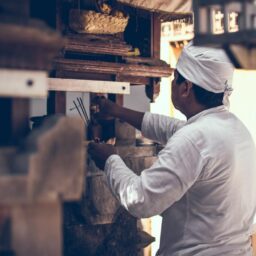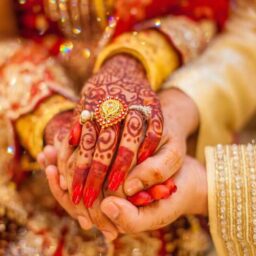INTRODUCTION
The term gotra is thought to be comparable to lineage in Hindu culture. It refers to those who are descended from a common male ancestor or patriline in an unbroken male line. The name of the gotra can be used as a surname, although it is distinct from a surname and is closely kept among Hindus, especially among castes, because of its importance in marriages. It is customary to practice in Hindu marriage preparation to inquire about the bride and groom’s kula-gotra (clan lineage) before approving the marriage. Siblings are considered within the gotra, and marrying one can increase the risk of a child contracting genetically transmitted diseases.[1] Marriage within the same gotra is not customary in virtually all Hindu families (since they are believed to be descended from the same family). While the gotras are usually universally utilized to rule out conventional incestuous weddings, they are not legally recognized as such, while individuals in “degrees of prohibited relationship” or who are “sapinda” are not allowed to marry. Haryana’s khap panchayats have fought to make it illegal to marry within the same gotra.
SA-GOTRA MARRIAGES
In India, the gotra of a person is determined by the gurus their ancestors followed. Families connected to the Bharadwaja gotra, for example, are devotees of Bharadwaja Maharishi. This, however, does not always imply that all of its members are related. Bharadwaja gotra was granted to them since different families from the same caste may have followed Bharadwaja Maharishi.
In some cases, the gotras were awarded according to a person’s profession. The gotra Vishwakarma or the Vishwabramhins had five gotras i.e. Saanaga clan had the profession of blacksmithy, Carpentry was carried out by the clan Sanatana, Ahabhoonasa clan pursued metallurgical works, Patnarasa clan worked on sculptures, and Suparnasa carried out goldsmithy. Viswakarma belongs to several different gotras. People of the same gotra in the above-mentioned clans do not necessarily come from the same family or origin of birth. Marriages between members of the same clan, on the other hand, were forbidden.
The primary reason behind the opposition against the same gotra marriages during recent times is that people belonging from the same gotras are considered as siblings. It is considered as inbreeding where the genetically transferred diseases would be carried on from the parents to their offspring.[2] However, in older times, it was not because of brother-sister relationships that intra-clan marriages were prohibited. They were outlawed to improve society for those like them. If marriages are permitted inside the Bharadwaja gotra, for example, the number of Bharadwaja devotees will be reduced. If a wife from another gotra is chosen, she will join Bharadwaja’s followers, increasing the total number of followers. This could be one of the reasons why intra-clan marriages are forbidden.
KHAP PANCHAYATS
Khap is a conglomeration of villages linked by caste and location. Marriages between members of the same ‘gotra,’ or ancestral lineage, are frowned upon by the khaps. The original motivation was to avoid inbreeding and the resulting birth of offspring with abnormalities. While this is no longer an issue, sa-gotra – in-gotra – marriages are still prohibited due to social brotherhood and honor.[3]
Khap panchayats have frequently been contrasted with Taliban-type fake courts and are notorious for forcing their savage decisions on youthful couples who wed inside their ‘gotra’ or ancestry. Even though their decisions have no lawful legitimacy, khap panchayats are socially extremely incredible and have prevailed with regards to adhering to their alleged customs. Couples who abuse the gotra rule normally face demise, while their relatives are disregarded as pariahs. Numerous youthful couples who have set out to wed inside their gotra have been killed or have ended it all. For instance, in June 2009 a khap panchayat constrained Manoj and his better half Babli to drink pesticide. The high court granted to give police insurance to the two was to no end.[4]
ILLEGAL RESTRICTIONS IMPLEMENTED BY KHAP PANCHAYATS
Unlawful Assembly Is Prohibited (Interference with the Freedom of Matrimonial Alliances) the bill proposes that no person or group of people shall congregate with the intent of causing harm i.e. “intention to deliberate on, or condemn any marriage, not prohibited by law, on the basis that such marriage has dishonoured the caste or community tradition, or brought disrepute to all or any of the persons forming part of the community”[5]
Self-appointed authorities have intensified their illegal intimidation of sagotra (same gotra) unions, as well as inter-caste, inter-community, and inter-religious marriages between two yielding individuals, for the sake of safeguarding the reputation of family, caste, or community. On several occasions, such bodies have incited violence, and newly married or engaged couples have been subjected to intimidation and violence, leading to them being chased out of their homes and even killed.
“Although such intimidation or acts of violence constitute offenses under the IPC, yet, it is necessary to prevent assemblies which take place to condemn such alliances,” proposes Bill. Its goal is to put a stop to evil by preventing the spread of hatred and instigation to violence through such gatherings. Criminal intimidation shall be defined according to Section 503 of the IPC. The proposed bill also states that any affiliate of an illegitimate assemblage who counsels, exhorts, or exerts demands on any individual or any number of individuals to thwart or criticize of the marriage to which the members of the illegal congregation object, or generates a hostile milieu toward such couple, shall be deemed to have acted in endangering the couple, whether alone or in concert with other members.
According to the Law Commission’s consultation document, panchayats organized along social group lines believe they have the authority to deal with “objectionable” matrimonies, have little concern for existence and liberty, which are not to be dissuaded by legal proceedings. The penal code does not apply directly to the illicit acts of social group meetings, and this requires to be changed. The Hindu Marriage Disabilities Removal Act, 1946, was put forward to clear concerns, according to Law Commission, pointing out those same gotra weddings are not forbidden by law, whatever the attitude in the past may have been.
Marriages between Hindus from the same gotra, or different caste sub-divisions, are common and were expressly deemed legal by the Act. “No one has the right to employ force or impose far-reaching sanctions in the name of vindicating community or family honor,” it states. Any violation of the Bill will result in a three-year prison sentence and a fine of up to Rs 30,000. All offenses will be cognizable, non-bailable, and non-compoundable under the proposed Act. Special Courts will hear the cases, which will be presided over by a session’s judge or an additional session’s judge. The Special Court has the authority to take cases on its initiative.
CONCLUSION
Pseudo-theorists argue that because all genes in a clan descended from the same progenitor, marriages among the gotra will produce problems for the descendants due to the coalescing of the same genes; that is the reason why our forefathers forbade clan unions. Because, as we showed previously, the inhabitants of a gotra descend from families of various origins, this argument is false. Furthermore, as the spouses originate from different parents, the genes alter throughout time. As a result, it can be argued that families with the same gotra are not descended from the same ancestor. They are not related to one other. As a result, it is impossible to say that a male and female belonging to the same gotra have a relationship of siblings. This idea should be instilled in the people of Haryana, as well as the rest of the country, to eradicate superstition and age-old beliefs.
Author(s) Name: Pratyasha Sahu (Symbiosis Law School, Hyderabad)
References:
[1] M. V. Anjaneyalu, ‘People of the same gotra do not necessarily have the same origin’ (The Hindu, 4 July)
[2] Ronojoy Sen, ‘Same-gotra marriage legal, court had ruled 65 years ago’ (The Times Of India, 15 May 2010)
[3] What is khap panchayat? (India Today, October 11, 2012) <https://www.indiatoday.in/india/north/story/what-is-khap-panchayat-118365-2012-10-11?utm_source=washare&utm_medium=socialicon> accessed 20 August 2021
[4] Arun Anand, ‘Khap panchayats — the role & history of complex social institution in Haryana & western UP’ (The Print, 3 March, 2021)
[5] Aarti Dhar, ‘Law Commission’s new draft wants khap panchayats on marriages declared illegal’ (The Hindu, 5 November 2016)
















